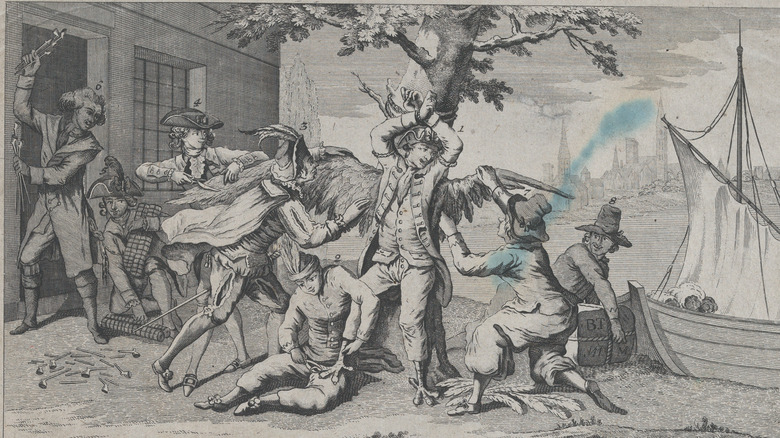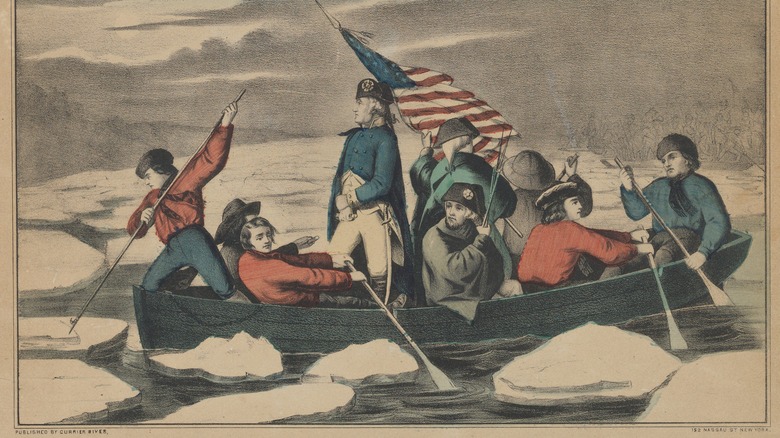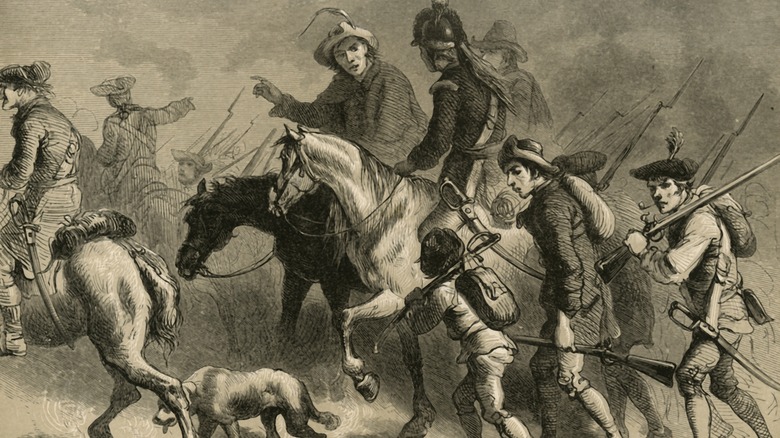The Big Lie About Revolutionary Soldiers You Learned In History Class
History is written by those who win, and this fact is perfectly exemplified in coverage of the Revolutionary War that eventually brought independence to the United States. It was a hard-fought battle that saw many men (and some women) die for the cause.
Many Americans are taught that the British had made life difficult for many, which is why people like George Washington and Alexander Hamilton inspired people to take up arms. But in reality, the revolution was not exactly popular and was only supported by an estimated 45 percent of citizens, explained Lumen Learning. People believe the opposite because the very existence of the United States as a superpower has so much to do with the myth that surrounds the events of 1775 and the eight-year war that followed.
A quick refresher: The war formally began in April 1775 after a series of skirmishes between the Americans and the British. Per History, it involved the original 13 colonies, and there is a multitude of reasons why it started in the first place. Mostly, the British had raised taxes so much to pay for the many global conflicts they found themselves in.
The Americans were not fond of tax increases, as expected, and a wave of protests hit cities across the country. One of these was the Boston Tea Party. Eventually, a group of men gathered together to form the Continental Congress and set forth their demands to the British government. These were ignored.
Enticing volunteers
According to Smithsonian Magazine, the Revolutionary War initially got wide support — the first call to arms was met with enthusiasm. Thousands of militiamen from other towns in Massachusetts came down to Concord to defend a rebel armory. Pretty soon, other New England territories joined the fight. As Smithsonian Magazine puts it, it seemed like every American man not part of the British Army had taken up arms against the Crown.
But like many long-running wars, it soon started to weigh on the public. It became apparent that being in the Revolutionary Army was no walk in the park. Per the University of Rochester, a higher percentage of the population died during the revolution than any other conflict involving Americans. Of course, it has to be noted that the population was smaller in those times than it is now.
Even though the Revolutionaries found many volunteers in the beginning, it became harder to convince men to leave their homes and farms to fight the British as the war went on. Washington even said men kept to their "Chimney Corners" and volunteers were "a drop in the ocean." To get more men to join the Revolutionary Army, some colonists even had to resort to giving cash, blankets, and clothes to entice them to take up arms.
Towns conscripted men when voluntary enlistment numbers were very low. Congress initially forbid enlisting Black men, but desperation won over, and the Revolutionary Army allowed them to join the fight against the British.
Fence sitters
Many men refused to join the American Revolution because they feared significant time away from their farms would mean losing crops. If they weren't able to produce crops, many farmers could lose their property and their income.
However, it wasn't just the hardship of fighting the war that turned off many people. U.S. History.org said a large part of the population was undecided about their support for the Revolution. Many considered themselves British citizens and were confused as to why the country should fight their rulers. Others just didn't feel strongly either way and just wanted to live their lives. It was this group that the "Patriots," or the Revolutionary leaders, had to convince.
This also meant that many Americans — they were called the "Loyalists" — remained devoted to the king. While there were fewer Loyalists, it was still enough of a concern that the Patriots tried to humiliate the Loyalists by vandalizing their homes or looting their property. The fight between Loyalists and Patriots even tore families apart. Benjamin Franklin's illegitimate son, William, continued to support Britain even as his father was one of the leading figures of the Revolution. The rift between them was so bad that the elder Franklin disowned his son.
In the end, many of these Loyalists fled to Canada or England. And, as the winners of the war, the Americans were able to control the narrative and made it seem that it was a popular political fight.


